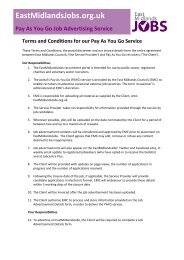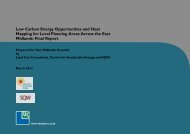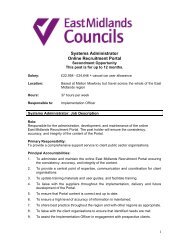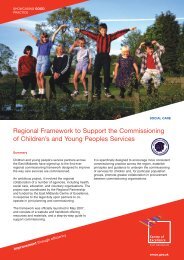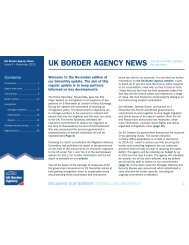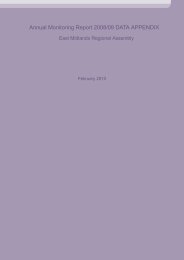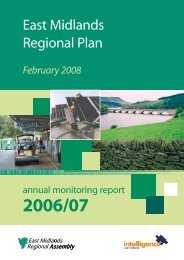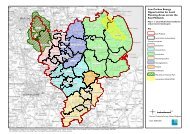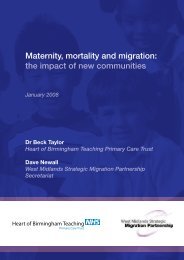East Midlands Regional Spatial Strategy 2005/06
East Midlands Regional Spatial Strategy 2005/06
East Midlands Regional Spatial Strategy 2005/06
Create successful ePaper yourself
Turn your PDF publications into a flip-book with our unique Google optimized e-Paper software.
egion is one of the largest suppliers nationally it has<br />
a significant role to play in the nation’s economic<br />
prosperity. Whilst the supply of aggregates is lower<br />
than the apportionment figure this continues a trend<br />
of lower production over the past 5 years. However,<br />
at a national level, the demand model is deemed to<br />
be robust. It is recognised that the environmental<br />
capacity of the Region to continue that supply needs<br />
to be considered, particularly in areas such as the<br />
Peak Park and other regionally significant<br />
environmentally sensitive areas. Therefore the role of<br />
recycled and secondary aggregates will continue to<br />
play a growing part in sustainable aggregate<br />
provision.<br />
6.9 The publication of MPS1 in late 20<strong>06</strong> will mean<br />
that any revision of RSS policy should consider the<br />
mineral resources available for a range of regionally<br />
significant minerals against the existing and future<br />
patterns of supply.<br />
Policy 38: <strong>Regional</strong> Waste <strong>Strategy</strong> (RWS)<br />
A <strong>Regional</strong> Waste <strong>Strategy</strong> will be drawn up based<br />
on the following principles:<br />
• Working towards zero growth in waste at the<br />
regional level<br />
• Reducing the amount of waste sent to landfill<br />
• Exceeding Government targets for recycling and<br />
composting<br />
• Taking a flexible approach to other forms of<br />
waste recovery<br />
6.10 This policy was implemented by the <strong>Regional</strong><br />
Assembly and the RTAB working through a subgroup<br />
called the <strong>Regional</strong> Waste <strong>Strategy</strong><br />
Development Group (RWSDG).The RWSDG consisted<br />
of various stake holders including; the waste industry<br />
trade body ESA (Environmental Services Association),<br />
representatives of environmental groups,<br />
representatives of the waste collection and disposal<br />
authorities, representatives of various educational<br />
establishments and representatives of the Waste and<br />
Resources Action Programme (WRAP), as well as the<br />
<strong>East</strong> <strong>Midlands</strong> Development Agency and the<br />
Government Office for the <strong>East</strong> <strong>Midlands</strong>. The broad<br />
scope of the RWS means that whilst it has planning<br />
policies at its core, it goes beyond a traditional landuse<br />
planning document. The lead partners for some<br />
of the proposed actions are not planning or waste<br />
authorities.<br />
Targets:<br />
• To produce a <strong>Regional</strong> Waste <strong>Strategy</strong>.<br />
Indicators:<br />
• Production of <strong>Strategy</strong><br />
Results and Data Analysis<br />
6.11 The <strong>East</strong> <strong>Midlands</strong> <strong>Regional</strong> Waste <strong>Strategy</strong> was<br />
published in January 20<strong>06</strong><br />
(www.emra.gov.uk/waste/documents.htm).<br />
Subsequent documents include Waste Planning<br />
Guidance for the <strong>East</strong> <strong>Midlands</strong> Assembly (August<br />
20<strong>06</strong>) and the Waste Treatment Capacity Study (July<br />
20<strong>06</strong>).<br />
6.12 The <strong>East</strong> <strong>Midlands</strong> <strong>Regional</strong> Waste <strong>Strategy</strong> is a<br />
key element of <strong>Regional</strong> Policy, providing a strategic<br />
framework which will allow the Region as a whole to<br />
rapidly progress to more sustainable ways to<br />
produce and consume goods, and then recycle or<br />
recover as much value as possible from that waste<br />
which is produced. It also has an important role to<br />
identify the current capacity of the Region to<br />
manage waste and to set out the waste<br />
management infrastructure which will need to be<br />
developed to meet future needs.<br />
6.13 The <strong>Regional</strong> <strong>Spatial</strong> <strong>Strategy</strong> sets out the<br />
principles and priorities for waste management:<br />
• To work towards zero growth in waste at the<br />
<strong>Regional</strong> level by 2016<br />
• To reduce the amount of waste sent to landfill in<br />
accordance with the EU Landfill Directive<br />
• To exceed Government targets for recycling and<br />
composting<br />
• To take a flexible approach to other forms of waste<br />
recovery<br />
<strong>East</strong> <strong>Midlands</strong> <strong>Regional</strong> <strong>Spatial</strong> <strong>Strategy</strong> Annual Monitoring Report <strong>2005</strong>/<strong>06</strong><br />
103




